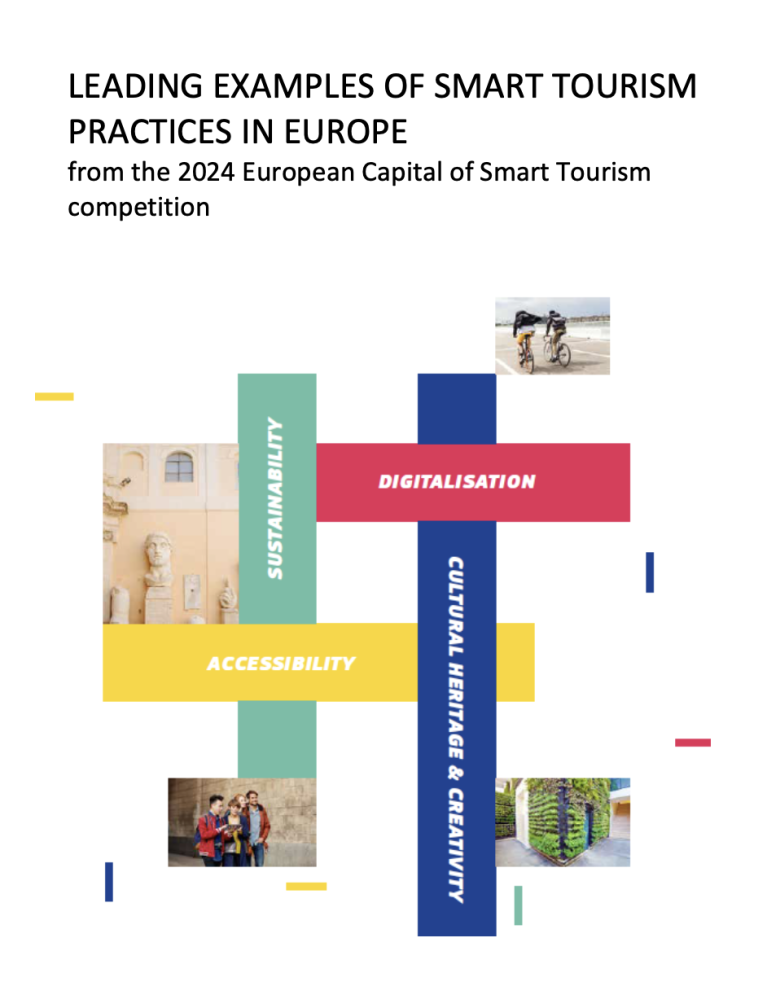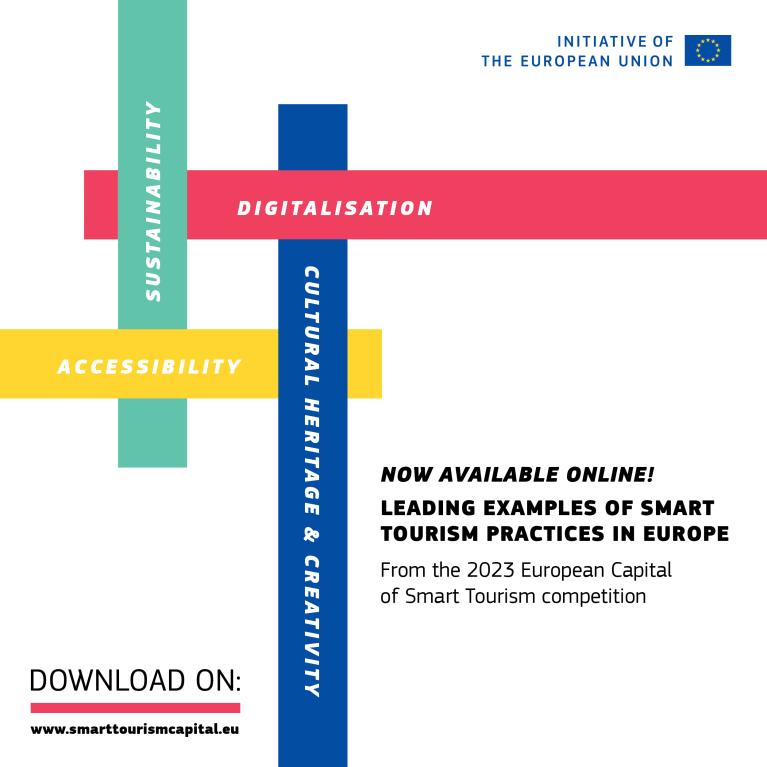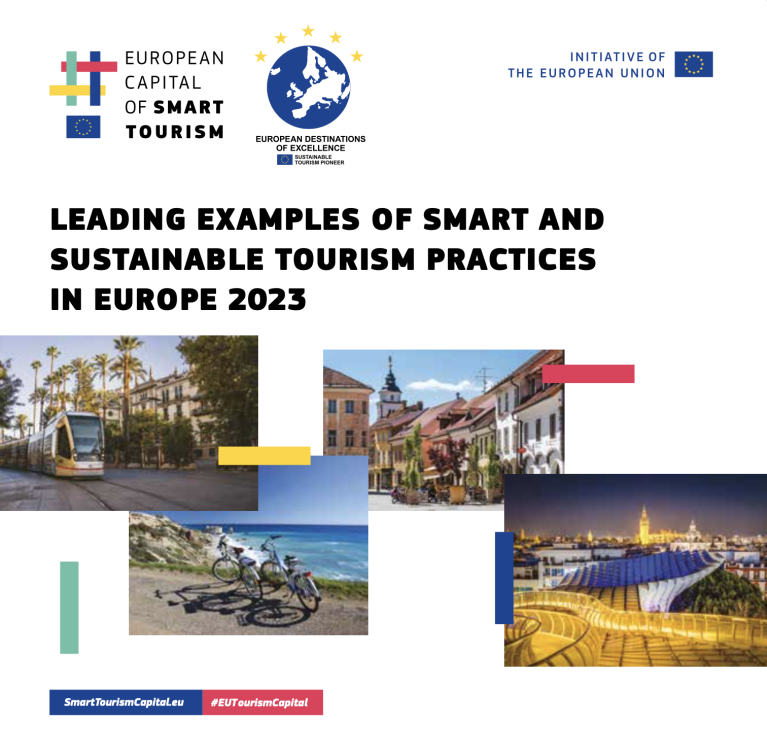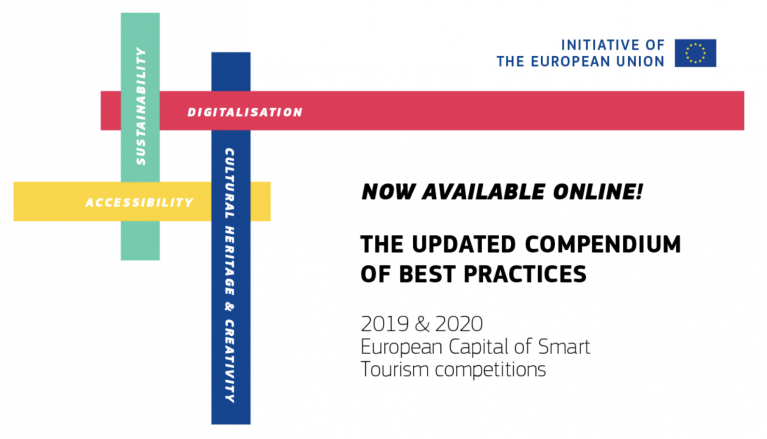The 2024 collection of best practices has been derived from applications that cities submitted to the European Capital of Smart Tourism competition. The report showcases the selection of best practices in each category (Accessibility, Sustainability, Digitalisation, Cultural heritage and creativity).
BEST PRACTICES IN ACCESSIBILITY
4.1.1 ACCESSIBILITY FOR ALL
- 4.1.1.1 Inclusivity for all: Odense
- 4.1.1.2 Accessible multifaceted cultural activities: Dublin; Essen
- 4.1.1.3 Accessible infrastructure: Bremerhaven; Gdynia
- 4.1.1.4 Involvement of local communities: Tiraspol
- 4.1.1.5 Accessible beaches: Genoa
- 4.1.1.6 Accessible parking: Dublin; Klaipeda
- 4.1.1.7 Accessible tourism sites: Cork; Padua; Iasi
- 4.1.1.8 Accessibility for families: Helsingborg
- 4.1.1.9 Accessible tourism management: Gijón; Thessaloniki; Lviv; Prishtina
4.1.2 ACCESSBILITY FOR INFORMATION
4.1.3 ACCESSIBILITY OF MOBILITY
- 4.1.3.1 Sustainable accessibility options: Bremerhaven; Parma; Izmir
- 4.1.3.2 Easy access to public services: San Sebastián; Helsingborg
- 4.1.3.3 Accessible public transport: Odense; Istanbul; Gaziantep
BEST PRACTICES IN SUSTAINABILITY
4.2.1 COMBATTING OR ADAPTING TO CLIMATE CHANGE
- 4.2.1.1 Sustainable Action Plans: Bremerhaven; Dublin
- 4.2.1.2 Mitigating pollution: Thessaloniki
- 4.2.1.3 Sustainable education: Bremerhaven; Gaziantep; Klaipeda; Saint-Denis
- 4.2.1.4 Sustainable innovation: Gijón
4.2.2 PRESERVING OR ENHANCING THE NATURAL ENVIRONMENT
- 4.2.2.1 Nature preservation: Odense; Parma; Lviv; Padua
- 4.2.2.2 Sustainable Urban Planning: Helsingborg; Izmir; Prishtina
4.2.3 SUSTAINABLE TOURISM MANAGEMENT
- 4.2.3.1 Tourism development: Cork; Iasi; Istanbul; San Sebastián
- 4.2.3.2 Mitigating tourism seasonality: Gdynia
4.2.4 SUSTAINABLE MOBILITY
- 4.2.4.1 Cycling Opportunities for Tourists: Dublin; Saint-Denis
- 4.2.4.2 Sustainable public transport: Gdynia
- 4.2.4.3 Sustainable outdoor tourism: Genoa
4.2.5 SUSTAINABLE INVOLVEMENT OF LOCAL COMMUNITIES
4.3 BEST PRACTICES IN DIGITALISATION
4.3.1 FACILITATING INFORMATION FOR SPECIFIC TARGET GROUPS
- 4.3.1.1 Digital Innovation in City Guides: Cork; Bremerhaven; Genoa
- 4.3.1.2 Digital Tours and City Exploration: Odense; Parma; Helsingborg
4.3.2 COLLECTING INFORMATION FOR SMART MANAGEMENT
- 4.3.2.1 Open Data for Improving Tourism: Gijón; Dublin; Istanbul
- 4.3.2.2 Smart Urban Management: Thessaloniki; Padua
- 4.3.2.3 Digital municipal solutions: Tetovo
- 4.3.2.4 Digital solutions in business: San Sebastián
4.3.3 TRANSFORMATION INTO DIGITAL KNOWLEDGE SHARING
- 4.3.3.1 Digital Access to information: Prishtina; Gaziantep; Saint-Denis
- 4.3.3.2 Promotion of digital innovations: Lviv; Klaipeda
- 4.3.3.3 Digitalisation in cultural spaces: Eskisehir
- 4.3.3.4 Digital Culture and History Experiences: Dublin; Essen; Helsingborg
4.3.4 INNOVATIVE MOBILITY THROUGH DIGITALISATION
- 4.3.4.1 Smart Benches: Iasi
- 4.3.4.2 Local community engagement: Skopje
- 4.3.4.3 Knowledge and technological capabilities: San Sebastián
4.4 BEST PRACTICES IN CULTURAL HERITAGE & CREATIVITY
4.4.1 REVIVAL OF CULTURAL HERITAGE
- 4.4.1.1 Experiential Tourism Projects: Gijón
- 4.4.1.2 Cultural events & Festivities: Thessaloniki; Bremerhaven; Odense; Parma
- 4.4.1.3 Preservation of cultural heritage: Istanbul; Izmir; Essen; Prishtina
- 4.4.1.4 Establishing national institution: Bremerhaven
- 4.4.1.5 Preserving the traditional spirit: Gaziantep; Klaipeda
4.4.2 CREATING COMMUNAL INFRASTRUCTURES
4.4.3 CULTURAL HERITAGE USAGE FOR NEW CREATIVITY
- 4.4.3.1 Promotion of creative industries: Gdynia; Iasi; Matosinhos
- 4.4.3.2 Use of new technologies: Amiens; Genoa
- 4.4.3.3 Creating New Cultural Spaces: Helsingborg; Odense
4.4.4 MAINTAINING CULTURAL HERITAGE
- 4.4.4.1 Community Engagement: Cork; Barcelos
- 4.4.4.2 Cultural Heritage & Creativity Strategies: San Sebastián

Download the Compendium of Best Practices

Leading Examples of Smart Tourism practices in Europe from the 2024 European Capital of Smart Tourism competition.
This report has been prepared in 2024 for the European Commission, Directorate-General Internal market, Industry, Entrepreneurship and SMEs (DG GROW)

The 2023 collection of best practices has been derived from the applications the cities submitted to the competition. The report showcases the selection of best practices in each category (Accessibility, Sustainability, Digitalisation, Cultural Heritage and Creativity) and solely presents and relies on the data that the cities have submitted in their applications.

The selection of best practices compiled in this booklet has been derived from the applications that cities submitted to the 2023 competition and solely presents and relies on the information and data that the cities have submitted in their applications.

The 2022 collection of best practices has been derived from applications that cities submitted to the European Capital of Smart Tourism competition. The report showcases the selection of best practices in each category (Accessibility, Sustainability, Digitalisation, Cultural heritage and creativity). The purpose of this document is to enhance and facilitate the exchange of best practices in promoting innovative and smart measures and initiatives for tourism destinations in EU Member States. The report aims at raising awareness about smart tourism tools, measures and projects, sharing the best practices in tourism implemented by cities and strengthening peer-to-peer learning and innovative development of tourism in the EU in general.

